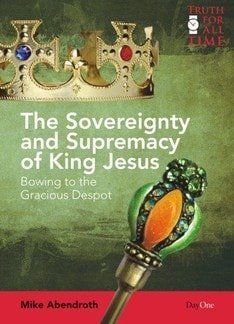The Sovereignty and Supremacy of King Jesus: Bowing to the Gracious Despot,
Mike Abendroth
Day One Publications
239 pages, £10.00
Star rating: 4
This book offers a refreshing vision of divine sovereignty. This is surely in need of recovery and Mike Abendroth has done the church a service in producing this work. The sub-title ‘Bowing to the Gracious Despot’ may raise questions in the minds of some readers. However, in the opening chapter ‘Jesus Christ is a Despot’, the author responsibly defends his position with biblical evidence to demonstrate that Jesus is indeed the ‘Sovereign Master’ (37-38). Each chapter concludes with a doxological dimension, whereby a well-chosen hymn emphasises this truth. The lesson stands: Divine sovereignty should be a catalyst for divine worship.
It is evident that Abendroth is contending for a well-worn theological path. He expounds that ‘God is King’ from Scripture, Reformed confessions, and the writings of Martin Luther, John Calvin, Charles Spurgeon and Louis Berkhof, to name just a few quoted preachers (45-48, 89-100). Chapter Four explains that ‘Christ was anointed to be our Prophet, Priest and King’ and it is clear that this doctrine has its roots in the Protestant tradition. That being the case, why is it so commonly neglected today?
The influence of a man-centred religion, rather than a God-centred one, is keenly felt when Christian ministers ‘share’ instead of ‘proclaim’ (124-126); it is evident when people approach God in prayer casually (151-164); or when worship becomes entertainment-based (183-196). Instead, those people who appreciate God’s majesty should preach as heralds of the King, and draw near to the throne of grace with reverence. Here lies an all too common contemporary problem. Abendroth identifies that losing sight of this powerful doctrine will commonly lead to a theological downgrade.
The book could have been further strengthened however, if there had been more elaboration on the doctrine of the Trinity. The emphasis is placed upon ‘God as King’ and ‘Christ as King’ but the New Testament reveals the new covenant name of God to be ‘the Father, and the Son, and the Holy Spirit’ (Matthew 28:19). If the author had more pervasively drawn attention that the Lord Jesus is the Second Person of the Trinity, it would enhance our understanding of Christ.
This book is firmly recommended. Pastoral experience often testifies that when a Christian grasps the sovereignty of God, then a wholesale reformation of their knowledge of God follows. It is hoped that this publication will contribute to a recovery of biblical and reformed doctrine.
Kevin Bidwell,
Sheffield




